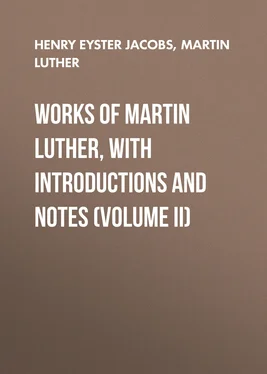Henry Eyster Jacobs - Works of Martin Luther, with Introductions and Notes (Volume II)
Здесь есть возможность читать онлайн «Henry Eyster Jacobs - Works of Martin Luther, with Introductions and Notes (Volume II)» — ознакомительный отрывок электронной книги совершенно бесплатно, а после прочтения отрывка купить полную версию. В некоторых случаях можно слушать аудио, скачать через торрент в формате fb2 и присутствует краткое содержание. Жанр: foreign_prose, foreign_religion, Философия, foreign_psychology, foreign_antique, на немецком языке. Описание произведения, (предисловие) а так же отзывы посетителей доступны на портале библиотеки ЛибКат.
- Название:Works of Martin Luther, with Introductions and Notes (Volume II)
- Автор:
- Жанр:
- Год:неизвестен
- ISBN:нет данных
- Рейтинг книги:3 / 5. Голосов: 1
-
Избранное:Добавить в избранное
- Отзывы:
-
Ваша оценка:
- 60
- 1
- 2
- 3
- 4
- 5
Works of Martin Luther, with Introductions and Notes (Volume II): краткое содержание, описание и аннотация
Предлагаем к чтению аннотацию, описание, краткое содержание или предисловие (зависит от того, что написал сам автор книги «Works of Martin Luther, with Introductions and Notes (Volume II)»). Если вы не нашли необходимую информацию о книге — напишите в комментариях, мы постараемся отыскать её.
Works of Martin Luther, with Introductions and Notes (Volume II) — читать онлайн ознакомительный отрывок
Ниже представлен текст книги, разбитый по страницам. Система сохранения места последней прочитанной страницы, позволяет с удобством читать онлайн бесплатно книгу «Works of Martin Luther, with Introductions and Notes (Volume II)», без необходимости каждый раз заново искать на чём Вы остановились. Поставьте закладку, и сможете в любой момент перейти на страницу, на которой закончили чтение.
Интервал:
Закладка:
"After they are used to this, we will create thirty or forty cardinals in a day 143 143 The creation of new cardinals was a lucrative proceeding for the popes. On July 31, 1517, Leo X created thirty-one cardinals, and is said to have received from the new appointees about 300,000 ducats. Needless to say, the cardinals expected to make up the fees out of the income of their livings. See Weimar Ed. , VI, 417, note I, and Pastor, Gesch. der Papste IV, I, 137. C. Hutten's Vadiscus (Bocking IV, 188).
, and give to one Mount St. Michael at Bamberg 144 144 The famous Benedictine monastery just outside the city of Bamberg.
and the bishopric of Würzburg to boot, hang on to these a few rich livings, until churches and cities are waste, and after that we will say, 'We are Christ's vicars and shepherds of Christ's sheep; the mad, drunken Germans must put up with it.'"
I advise, however, that the number of the cardinals be reduced, or that the pope be made to keep them at his own expense. Twelve of them would be more than enough, and each of them might have an income of a thousand gulden a year 145 145 The proposal made at Constance (see above, p. 82, note 2) was more generous. It suggested a salary of three to four thousand gulden.
. How comes it that we Germans must put up with such robbery and such extortion of our property, at the hands of the pope? If the Kingdom of France has prevented it 146 146 As early as the XIV Century both England and France had enacted laws prohibiting the very practices of which Luther here complains. It should be noted, however, that these laws were enforced only occasionally, and never very strictly.
, why do we Germans let them make such fools and apes of us? It would all be more bearable if in this way they only stole our property; but they lay waste the churches and rob Christ's sheep of their pious shepherds, and destroy the worship and the Word of God. Even if there were not a single cardinal, the Church would not go under. As it is they do nothing for the good of Christendom; they only wrangle about the incomes of bishoprics and prelacies, and that any robber could do.
[Sidenote: The Curia]
3. If ninety-nine parts of the papal court 147 147 The papal court or curia consisted of all the officials of various sorts who were employed in the transaction of papal business, including those who were in immediate attendance upon the person of the pope, the so-called "papal family." On the number of such officials in the XVI Century, see Benrath, p. 88, note 18, where reference is made to 949 offices, exclusive of those which had to do with the administration of the city of Rome and of the States of the Church, and not including the members of the pope's "family." The Gravamina of 1521 complain that the increase of these offices in recent years has added greatly to the financial burdens of the German Church (Wrede, Deutsche Reichstagsakten unter Kaiser Karl V , II, 675).
were done away and only the hundredth part allowed to remain, it would still be large enough to give decisions in matters of faith. Now, however, there is such a swarm of vermin yonder in Rome, all boasting that they are "papal," that there was nothing like it in Babylon. There are more than three thousand papal secretaries alone; who will count the other offices, when they are so many that they scarcely can be counted? And they all lie in wait for the prebends and benefices of Germany as wolves lie in wait for the sheep. I believe that Germany now gives much more to the pope at Rome than it gave in former times to the emperors. Indeed, some estimate that every year more than three hundred thousand gulden find their way from Germany to Rome, quite uselessly and fruitlessly; we get nothing for it but scorn and contempt. And yet we wonder that princes, nobles, cities, endowments, land and people are impoverished! We should rather wonder that we still have anything to eat!
Since we here come to the heart of the matter, we will pause a little, and let it be seen that the Germans are not quite such gross fools as not to note or understand the sharp practices of the Romans. I do not now complain that at Rome God's command and Christian law are despised; for such is the state of Christendom, and particularly of Rome, that we may not now complain of such high matters. Nor do I complain that natural or temporal law and reason count for nothing. The case is worse even than that. I complain that they do not keep their own self-devised canon law, though it is, to be sure, mere tyranny, avarice and temporal splendor, rather than law. Let us see!
[Sidenote: The Annates]
In former times German emperors and princes permitted the pope to receive the annates from all the benefices of the German nation, i. e., the half of the first year's revenues from each benefice 148 148 On the annates, see Vol. I, p. 383, note 1. Early in their history, which dates from the beginning of the XIV. Century, the annates ( fructus medii temporis ) had become a fixed tax on all Church offices which fell vacant, and the complaint of extortion in their appraisement and collection was frequently raised. The Council of Constance restricted the obligation to bishoprics and abbacies, and such other benefices as had a yearly income of more than 24 gulden. The Council of Basel (1430) resolved to abolish them entirely, but the resolution of the Council was inoperative, and in the Concordat of Vienna (1448) the German nation agreed to abide by the decision of Constance. On the use of the term "annates" to include other payments to the curia, especially the servitia , see Catholic Encyclopedia, I, pp. 537 f. Luther here alleges that the annates are not applied to their ostensible purpose, viz., the Crusade. This charge is repeated in the Gravamina of the German Nation presented to the Diet of Worms (1521), with the additional allegation that the amount demanded in the way of annates has materially increased (A. Wrede, Deutsche Reichstagsakten unter Kaiser Karl V. , II, pp. 675 f.). Similar complaints had been made at the Diet of Augsburg (1518), and were repeated at the Diet of Nürnberg (Wrede, op. cit. , III, 660). Hutten calls the annates "a good at robbery" ( Ed. Böcking, IV, 207). In England the annates were abolished by Act of Parliament (April 10, 1532)
. This permission was given, however, in order that by means of these large sums of money, the pope might accumulate a treasure for fighting against the Turks and infidels in defence of Christendom, so that the burden of the war might not rest too heavily upon the nobility, but that the clergy also should contribute something toward it. This single-hearted devotion of the German nation the popes have so used, that they have received this money for more than a hundred years, have now made of it a binding tax and tribute, and have not only accumulated no treasure, but have used the money to endow many orders and offices at Rome, and to provide these offices with salaries, as though the annates were a fixed rent.
[Sidenote: Saracen-tax]
When they pretend that they are about to fight against the Turks, they send out emissaries to gather money. Ofttimes they issue an indulgence on this same pretext of fighting the Turks 149 149 On the crusading-indulgences, see Vol. I, p. 18.
, for they think the mad Germans are forever to remain utter and arrant fools, give them money without end, and satisfy their unspeakable greed; though we clearly see that not a heller of the annates or of the indulgence-money or of all the rest, is used against the Turks, but all of it goes into the bottomless bag. They lie and deceive, make laws and make agreements with us, and they do not intend to keep any of them. All this must be counted the work of Christ and St. Peter!
Now, in this matter the German nation, bishops and princes, should consider that they too are Christians, and should protect the people, whom they are set to rule and guard in things temporal and spiritual, against these ravening wolves who, in sheep's clothing, pretend to be shepherds and rulers; and, since the annates are so shamefully abused and the stipulated conditions are not fulfilled, they should not permit their land and people to be so sadly robbed and ruined, against all justice; but by a law of the emperor or of the whole nation, they should either keep the annates at home or else abolish them again 150 150 i. e., As was done by the Council of Basel. See above, p. 84, note i.
. For since the Romans do not keep the terms of the agreement, they have no right to the annates. Therefore the bishops and princes are bound to punish or prevent such thievery and robbery, as the law requires.
Интервал:
Закладка:
Похожие книги на «Works of Martin Luther, with Introductions and Notes (Volume II)»
Представляем Вашему вниманию похожие книги на «Works of Martin Luther, with Introductions and Notes (Volume II)» списком для выбора. Мы отобрали схожую по названию и смыслу литературу в надежде предоставить читателям больше вариантов отыскать новые, интересные, ещё непрочитанные произведения.
Обсуждение, отзывы о книге «Works of Martin Luther, with Introductions and Notes (Volume II)» и просто собственные мнения читателей. Оставьте ваши комментарии, напишите, что Вы думаете о произведении, его смысле или главных героях. Укажите что конкретно понравилось, а что нет, и почему Вы так считаете.












